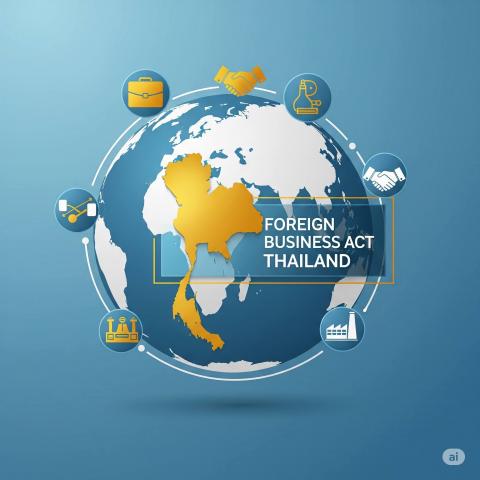Navigating Business in Thailand: The Foreign Business Licence (FBL)
For foreigners looking to establish or operate a business in Thailand, understanding and complying with Thai law is crucial. The primary regulation governing foreign participation in Thai businesses is the Foreign Business Act B.E. 2542 (1999) (FBA). This act restricts certain business activities to Thai nationals. To legally engage in these restricted activities, a foreign-owned or majority foreign-owned company must obtain a Foreign Business Licence (FBL) from the Department of Business Development (DBD) at the Ministry of Commerce.
What is a Foreign Business Licence (FBL)?
A Foreign Business Licence (FBL) is an official permit that allows non-Thai individuals or juristic persons (companies where 50% or more of the capital is held by foreigners) to conduct specific business activities that are otherwise restricted under the Foreign Business Act. The FBA categorizes businesses into three lists:
- List 1: Businesses strictly prohibited to foreigners.
- List 2: Businesses related to national safety or security, arts and culture, traditional handicrafts, or natural resources and environment. Foreigners may operate these businesses only with Cabinet approval and an FBL.
- List 3: Businesses in which Thai nationals are not yet ready to compete with foreigners. Foreigners can operate these businesses by obtaining an FBL from the Director-General of the DBD with the approval of the Foreign Business Committee.
Without an FBL, operating in these restricted sectors can lead to significant legal penalties.
Why Do You Need an FBL?
If your intended business activity falls under List 2 or List 3 of the Foreign Business Act and your company is considered "foreign" (majority foreign-owned), you are legally required to obtain an FBL before commencing operations. This license ensures your business operates legally within the Kingdom of Thailand and provides a stable foundation for your commercial activities.
Attempting to circumvent the FBA, for example, through nominee shareholding structures, carries substantial risks, including fines and imprisonment.
Key Requirements for Obtaining an FBL
While specific requirements can vary based on the business activity, some general conditions for applying for an FBL include:
- Minimum Capital: Generally, a minimum capital of THB 2 million is required. For businesses under List 2 or List 3, this is often THB 3 million for each specific activity. The capital must be brought into Thailand within a specified timeframe.
- Business Plan: A detailed business plan outlining the business activities, financial projections, employment of Thai nationals, and potential benefits to Thailand (e.g., technology transfer, economic development) is usually required.
- Qualifications of the Applicant: The applicant (or directors/managers of the applying company) must meet certain qualifications, such as being of legal age and not being bankrupt.
- Impact Assessment: The authorities will assess the potential positive and negative impacts of the proposed business on Thailand's safety, security, economy, society, environment, and culture.
The FBL Application Process
The process for obtaining an FBL can be complex and time-consuming. It generally involves:
- Consultation and Eligibility Check: Determining if an FBL is required and if the business is eligible.
- Document Preparation: Gathering and preparing all necessary documents, which may include company registration documents, financial statements, details of shareholders and directors, the business plan, and other specific forms.
- Application Submission: Submitting the completed application and supporting documents to the Department of Business Development.
- Review by Authorities: The application is reviewed by the relevant officials and committees. This may involve requests for additional information or clarification.
- Approval and Licence Issuance: If approved, the FBL is issued upon payment of government fees. The process can take several months.
How PS Law & Business Can Assist You
Navigating the complexities of the Foreign Business Act and the FBL application process requires in-depth knowledge of Thai law and procedures. At PS Law & Business, our experienced team offers comprehensive legal services to foreign investors, including:
- Advising on the applicability of the Foreign Business Act to your specific business.
- Assisting with the preparation of all necessary documentation for the FBL application.
- Liaising with the Department of Business Development and other relevant government agencies on your behalf.
- Guiding you through the entire application process, from initial consultation to licence issuance.
- Advising on ongoing compliance requirements after obtaining the FBL.
Alternatives to an FBL
In some cases, there might be alternatives to obtaining an FBL. These can include structuring your business with majority Thai ownership (while ensuring proper legal safeguards) or seeking investment promotion under the Thailand Board of Investment (BOI). BOI promotion can offer various incentives, including permission for 100% foreign ownership for certain promoted activities, tax benefits, and easier work permit processes. Our firm can advise on the best structure for your specific circumstances.
Contact PS Law & Business today for a consultation on your Foreign Business Licence needs in Thailand.
Frequently Asked Questions (FAQ)
Q1: What is the Foreign Business Act (FBA) in Thailand?
A1: The FBA is the primary Thai law that governs and restricts how foreigners can conduct business in Thailand. It lists specific business categories that are prohibited or require a Foreign Business Licence for foreign participation.
Q2: Who is considered a "foreigner" under the FBA?
A2: A foreigner includes:
- A natural person who is not of Thai nationality.
- A juristic person (e.g., company) not registered in Thailand.
- A juristic person registered in Thailand where 50% or more of its capital shares are held by non-Thais or foreign entities.
Q3: How long does it take to get a Foreign Business Licence in Thailand?
A3: The processing time can vary significantly depending on the business type, the completeness of the application, and the workload of the authorities. It typically takes several months, potentially 4-6 months or longer from the date of submission.
Q4: What is the minimum capital requirement for an FBL?
A4: Generally, the minimum capital required is THB 2 million. For businesses falling under List 2 or List 3 of the FBA, the minimum capital for each business activity is usually THB 3 million. This capital must be remitted into Thailand.
Q5: Can I own 100% of my company in Thailand with an FBL?
A5: Yes, if your business falls under a category where an FBL can be granted to a 100% foreign-owned company, and your application is approved, you can have 100% foreign ownership.
Q6: What happens if I operate a restricted business without an FBL?
A6: Operating a restricted business without an FBL is illegal and can lead to severe penalties, including substantial fines, imprisonment for responsible individuals (e.g., directors), and cessation of the business.
Q7: Is Board of Investment (BOI) promotion different from an FBL?
A7: Yes. BOI promotion is a separate scheme designed to attract investment in specific industries that are beneficial to Thailand's economy. BOI-promoted companies may receive various incentives, including permission for majority or 100% foreign ownership in certain activities (even if normally restricted), tax exemptions, and other non-tax benefits. An FBL is a license under the Foreign Business Act. Sometimes, a BOI-promoted company may still need to notify or comply with certain aspects of the FBA, or a BOI certificate might serve in lieu of an FBL for specific promoted activities.
External Links
- Department of Business Development (DBD), Ministry of Commerce
- Thailand Board of Investment (BOI)
- Ministry of Foreign Affairs of the Kingdom of Thailand (for general information on Thailand)




